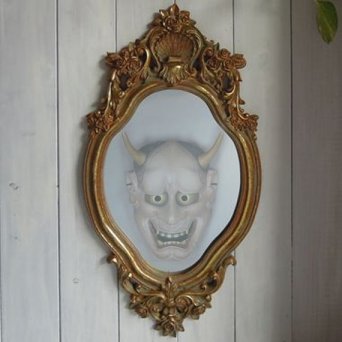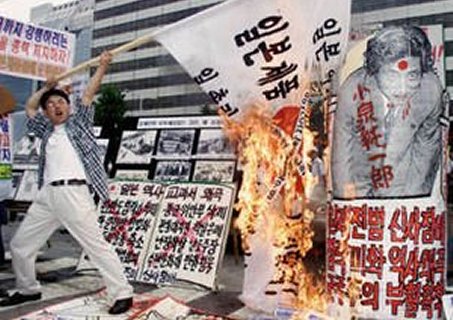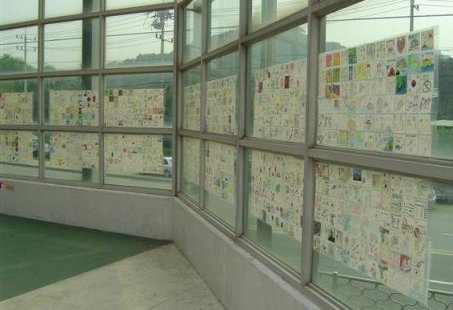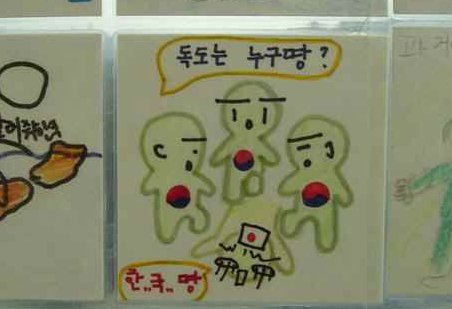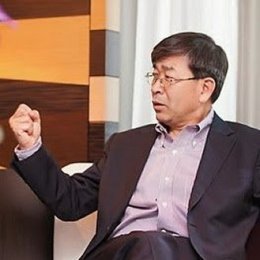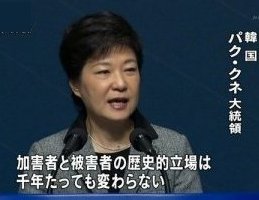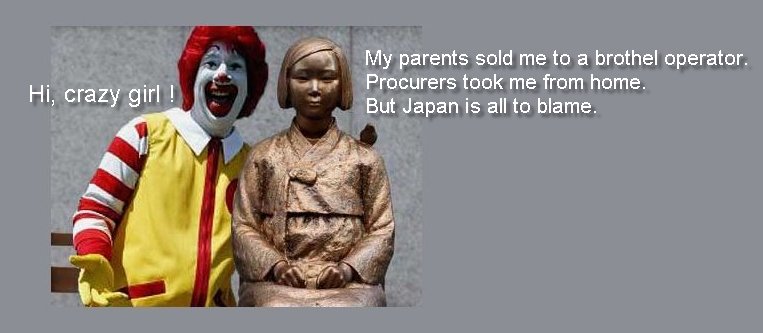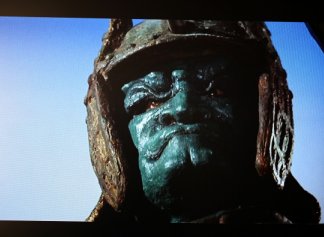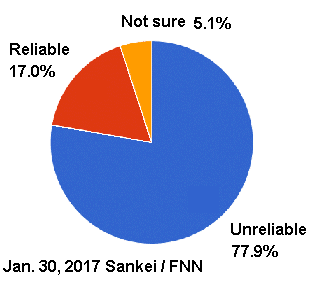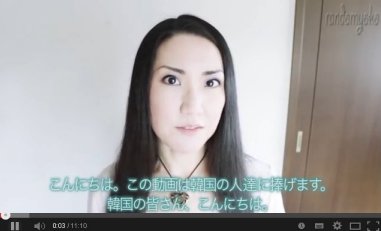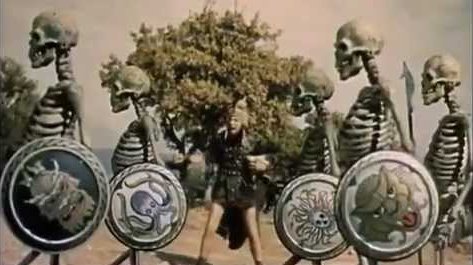Last Update: December 23, 2017
Moguro Fukuzo
I. FOREWORD
One important lesson to be learned from the Wisdom of Life is,
gIf you love people, the people will love you. If you hate people, the people will hate you. It is like looking into a mirror.h
We Japanese are exposed to South Koreansf relentless hatred and criticism for a period of almost entire life, as if we are the children of sinners and not entitled to be released from the fate forever.
Not any other race on earth is so severely persecuted by another race for such a long time since the end of the WWII. Therefore, I want South Koreans to look into the mirror and see if his or her face looks like a devil like this.
When you dance with the Devil, the Devil doesnft change. The Devil changes you. --- Amanda Hocking
II. WHY DO SOUTH KOREANS HATE US SO MUCH?
One evident phenomena is that S. Koreans who had actually gone through the Annexation Years (1910-1945) thought the days favorably, while younger Koreans, who were born after WWII and received the post-war anti-Japan education, are insanely vindictive against us.
Seoul before Annexation Seoul during Annexation One symbolic event that occurred in May, 2013 is the murder case of an old man of 95-years of age, Mr. Park. In a community park of Seoul, he found his old friends and said, gThe Annexation Years were good. I would say Good for Japan.h Fuan, a young man of 38-years of age, who happened to be there, heard the voice and flew into a rage, deprived the cane of the old man, and clubbed his head several times. Mr. Park died in a hospital due to head injury. The offender, Fuan, was sentenced to be guilty with 5 years of imprisonment.
Mr. Parkfs memoir is by no means an exceptional case. In early 1970s, when senior citizens in S. Korea who experienced the Annexation Years were still alive, many Japanese newspaper reporters stationed in Seoul reported that S. Koreans were generally friendly and sometime had shown great respect to the Japanese.
Many such reporters unanimously agree that the Korean society has become hostile to Japan from 1990 onwards, after civilian presidents took place of presidents with military backgrounds. As the security needs towards North Korea waned, their hostility changed the direction towards Japan.
LOWER LEFT: Exhibition of drawings created by children at a subway station in S. Korea
LOWER RIGHT: An example of the drawingsIn addition to the post-war anti-Japan education, other theories that explain the reasons of their hate against Japan include the following:
- (1) Economic reasons
- Economic slowdown/recession makes S. Koreans angry and frustrated. They vent their frustration and anger towards Japan. (This theory is advocated by KATSUMATA toshiyoshi, a Japanese economist well versed in the S. Korean economy.)
- (2) Japan as a villain
- Since the S. Korean society is divided into competing factions, they need a villain (Japan) against whom they are united to protest as one ethic group. (This theory is advocated by Kent Gilbert, a California-born American lawyer/journalist who lives in Japan for more than 40 years.)

- (3) S. Korea as a jealous freak
- S. Korea is an insanely jealous, vindictive female stalker. Kent Gilbert, a California-born lawyer/journalist staying in Japan, advocates this theory together with (2) above. According to his explanation, in 1910, Korea grabbed a handsome future-promising young man by Annexation, they thought. However, the man failed in the business (defeated by the war) and went bankrupt. Korea was forced to divorce from the man. While seeing Japan achieving the post-war economic success, Koreans felt it intolerable that her ex-husband alone would become happy. Now insanely jealous ex-wife tells all lies about their marriage only to annoy her former husband. (I assume Mr. Gilbert has been involved in many divorce cases as a lawyer and he knows much about womenfs mentality. However, I throw-up every time I read this part of his theory.)
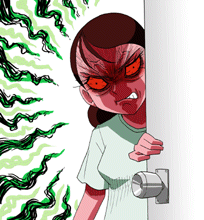
- (4) S. Koreans are wannabe victims
- Koreans pretend to be a victim all the time. The cultural background of this attitude is that the Korean people tend to consider that victims are allowed to do anything against the offender even beyond the norms of moral prudence.
After the Sewol ferry disaster, a relative of the disaster victim slapped the face of a government official, when he showed up to describe the current situation of the accident. Kim Dong-suk, founder of KACE, openly declared to a Korean newspaper that gwe shall slap Japanfs face using American hands.h This is exactly what the S. Koreans are doing today --- slapping Japanfs face using American hands.
KACE: Korean American Civic Empowerment
Soon after she assumed the office, S. Korean President Park Geun-hye declared that the relationship between Japan and Korea as victimizer and victim does not change for 1,000 years 1,000 years? Why does Japan have to look after the problem child forever? Her remarks of gno change for 1,000 yearsh infuriated many Japanese.
- (5) S. Korea is NPD
- S. Korea is NPD (Narcissistic Personality Disorder) as a nation. This is the authorfs own theory.
Views of the world from the standpoint of Neo-Confucianism explain this case well.
During the period of Ming-dynasty China (1368-1644), Yi-dynasty Korea (1392-1910) copied the system and culture in China as they thought everything in China was fine and the greatest, including eunuchsi¯j, civil servant exams iÈj, and particularly Neo-Confucianismiéqwjas official school of thoughts to govern the society.
Since the time Qing-dynasty China took over the Ming-dynasty China in 1644, Koreans were beginning to think China was contaminated with barbarian cultures since Qing-dynasty court nobles were composed of Manchurians. Manchurians were considered Northern Barbarians from the ethno-centric views of Neo-Confucianism. Koreans reached a conclusion that they were the only rightful heir of the right Confucian school. Thus, Korean version of ethno-centricity was born and developed.
The term gBarbarianh here means gNon-humanh such as serpents, frogs and reptiles. Britons and French were classified into Southern Barbarians as they came from the South via ships.
Japanese historians call Chinafs ethno-centrism as gBig Middle Kingdom IdeologyiåØjh and the Korean version of ethno-centrism as gSmall Middle Kingdom Ideologyi¬Øj.h
Koreafs ethno-centricity dictates that Neo-Confucianism is the only civilization and everything else belongs to the barbarian uncivilized land, hence civilized Korea is entitled to take the center-seat and Japan, the barbariansf land, is the periphery of the universe. Koreans translate this situation into the meaning that Koreans are gelder brother,h while Japan is his gyounger brother.h
Chinese Neo-Confucian World of Ethno-Centricity
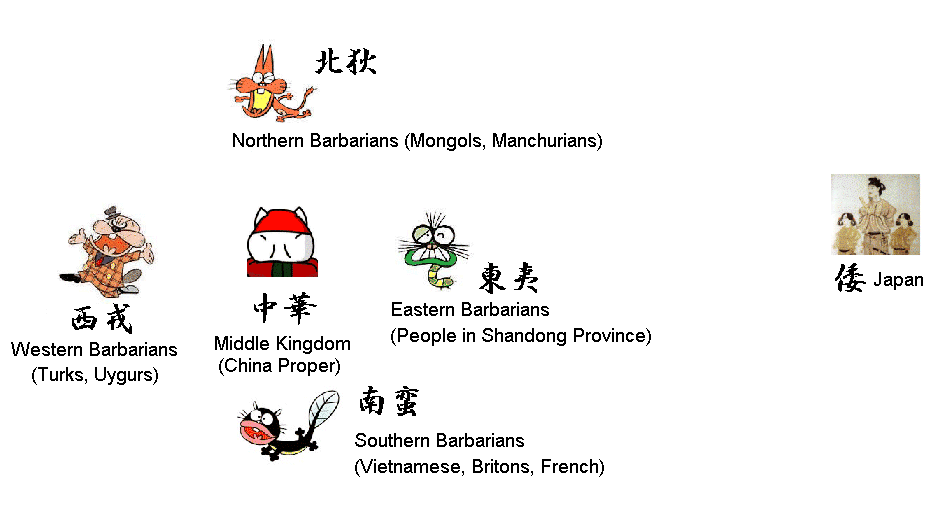
In Neo-Confucianism teachings, younger ones should serve older ones. Disobeying the elder brotherfs order is considered blasphemy and against human moral.
In fact, S. Koreans often tell us Japan is S. Koreafs younger brother and say that the younger brother has to help the elder brother at an economic crisis (no matter whatever it may sound unreasonable by modern standards).
While their own interpretation of civilization gives them Superiority Complex, in reality, Japan is superior to S. Korea virtually in every area of the modern civilization. This situation gives them Inferiority Complex.
Superiority Complex and Inferiority Complex that come up inside their brain alternately in rapid succession like neon signs blinking on and off made their mind unstable, caused mass-depression and mass-hysteria, and finally S. Koreans went insane as a whole nation.
This theory is proven by the fact that S. Koreans exhibit all symptoms of Narcissistic Personality Disorder.
Symptoms of Narcissistic Personality Disorder
- Has a grandiose sense of self-importance (e.g., exaggerates achievements and talents, expects to be recognized as superior without commensurate achievements)
- Is preoccupied with fantasies of unlimited success, power, brilliance, beauty, or ideal love
- Believes that he or she is gspecialh and unique and can only be understood by, or should associate with, other special or high-status people (or institutions)
- Requires excessive admiration
- Has a very strong sense of entitlement (e.g., unreasonable expectations of especially favorable treatment or automatic compliance with his or her expectations)
- Is exploitative of others (e.g., takes advantage of others to achieve his or her own ends)
- Lacks empathy (e.g., is unwilling to recognize or identify with the feelings and needs of others)
- Is often envious of others or believes that others are envious of him or her
- Regularly shows arrogant, haughty behaviors or attitudes
Generally, S. Koreans are arrogant, selfish, and rude. Their characters surprisingly match the symptoms of NPD listed above.
In short, persons with NPD consider that they are special and entitled to some special treatments. On the other hand, they consider others worthless rubbish.
Typical examples of behaviors showing such narcissistic-disordered S. Koreans are as follows:
- 1)
- Captain of the capsized ferry the Sewol, who left the sinking ship first leaving passengers behind;
- 2)
- Syngman Rhee, the first President of South Korea, who left Seoul first, leaving the citizens of Seoul behind, when the North Korean Army attacked the city; and,
- 3)
- Koreans are carrying out narcissistic smear campaigns againt Japan at every corner of the globe.

Captain of the Sewol tries to escape from the sinking ferry first, leaving passengers behind. Many young students died believing the announcement that said gStay there. Rescue Teams will come soon.h How can the captain of the ship do this shameless act? It is because he considers all but himself are just rubbish.
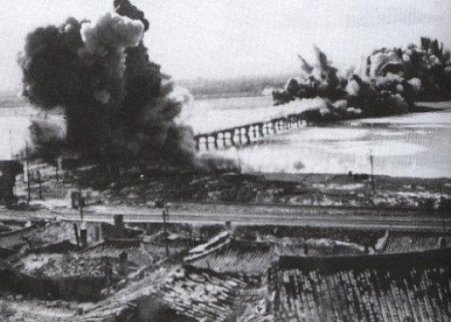

When the North Korean Army invaded South Korea and attacked Seoul, Syngman Rhee, the first President of South Korea, immediately declared the state capital is moved to Suwon and headed south, leaving the citizens of Seoul behind. He delivered the order to blow-up the bridge over the Han River, expecting it will interrupt the advancing enemy, while many citizens are still fleeing to safety over the bridge. It is believed that not less than 600 people died of the explosion. In Bodo League Massacre, Syngman Rhee and the South Korean Army killed unknown numbers of S. Koreans claiming that they were either communists or communist sympathizers.
How can anyone inflict these atrocities upon their own people? Clearly, Syngman Rhee did not care about the lives of other Koreans, because for his eyes they were just worthless rubbish and advertizing his strong anti-communist stance to the U.S. was his utmost priority,
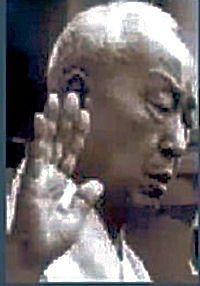
III. CHANGE OF TIDE IN JAPAN
Whatever the reasons of S. Koreansf blind hatred toward Japan are, their headlong drive of Anti-Japan Smear Campaign demonstrated in the past couple of years seems to have produced some resuts in the form of Korea Fatigue by Japan.
Do not underestimate the anger and resolve of the Japanese people. Korean smear campaign based on despicable lies is intolerable. You cannot continue to hurt our feelings and national pride without paying price for it.
Japan in 2011 Japan in 2016 Look at Japanese Comfort Women, who accounted for more than 60%. No one comes out to outcry their gjusticeh or grights.h No one comes out to demand Prime Minister of Japan to kneel down and apologize in humility as these old women of the Sharing House do.
They all knew world is not perfect and life is not entirely full of happiness. They all knew sacrifice of their own young days was necessary in order to bring happiness to their family. They even find dignity and pride in it, because they knew sacrifice of their own life arising from filial piety is contribution to their family's future. Same is true for prostitutes (modern-day comfort women) coming from poverty-stricken areas of the world you can find in streets today.
Korean demagogues and American/European collaborators do not know that there are six things that the Lord hates, seven that are an abomination to him: haughty eyes, a lying tongue, hands that shed innocent blood, a heart that devises wicked plans, feet that make haste to run to evil, a false witness who breathes out lies, and one who sows discord among brothers.
IV. HARVEST OF HATRED
According to Sankei/FNN joint survey conducted at the end of January, 2017, approximately 80% of the Japanese population considers that South Korea is unreliable as a partner of diplomatic and/or economic activities.
Listen to what Ms. Random Yoko has to say on the Japan - S. Korea relationship.
Click«Moreover, according to a government report published in February, 2016, there seems to be a significant decline in Japan-S. Korea relationship; (1) The direct investment of Japanese Companies in S. Korea in 2015 decreased by 63.0% compared with that in 2012 and (2) The number of Japanese tourists visiting S. Korea in 2015 decreased by 48.0% compared with that in 2012.
It was already a long-time ago when most of the Korean Pop-culture had disappeared from Japanfs TV broadcasts.
YOU HAVE TO KNOW THAT ANTI-JAPAN SMEAR CANPAIGN IS COSTLY.
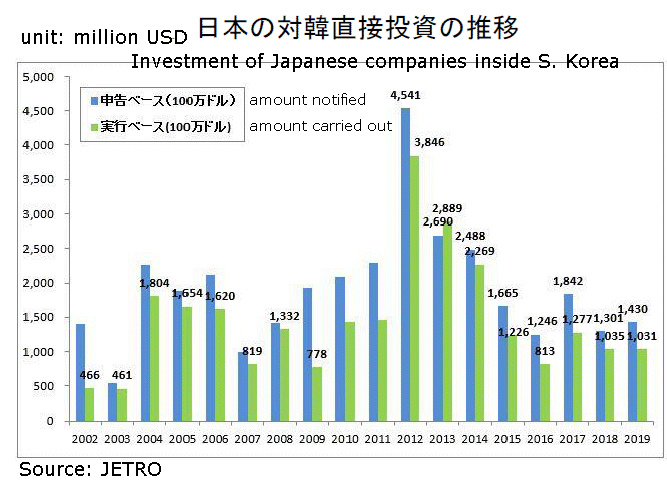
As the above graph clearly demonstrates, the period of 2012-13 was the turning point of deteriolation in the relationship between Japan and S. Korea.
Notice that there is a significant decrease of direct investment by the Japanese companies in S. Korea from 2012, which was the peak-time. One important point to note is that gthe decreaseh here does not only mean the dollar-amount of decrease. Since the Japanese companies (especially automobile/precision machinery manufacturers) are investing elsewhere such as Malaysia, Mexico, Thailand or Vietnam, soon or later S. Korean industries will have to face strong competitors in the international market.
2012 was the year in which S. Korean President Lee Myung-bak illegally landed on the Takeshima Island and then made disrespectful remarks about our Emperor. 2013 was the year in which the Comfort Women Memorial was installed in Glendale, CA. In the same year, current S. Korean President Park Geun-hye started her gfoul-mouthing diplomacyh in a malicious attempt to tarnish Japanfs reputation and thwart every move Japan was trying to make (e.g. Registration of Meiji Industrial Revolution Sites as World Heritage Status, and PM Abefs speech at the US Congress).
As the result, today, approximately 80% of the Japanese consider S. Koreans unreliable and 30% of the population openly says they hate S. Koreans. In all age-brackets from 20s to 60s, S. Korea is one of the most hated countries for the Japanese, next only to China.
We Japanese do not grumble aloud and know that persuasion comes first in every occasion. However, when all such reasonable efforts fail to work, we will resort to an action. We will do whatever we believe it the right thing to do for the hostile enemy, silently and without warning. South Koreans have to face the silent revolt of the Japanese from now on, and they have to reap what they sow.
Reap what you sow
